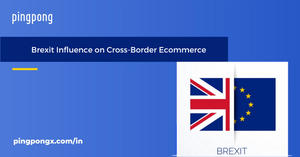On January 1st, 2021, the UK officially withdrew from the market and customs union of the European Union. Since then, a customs barrier has officially been established between the UK and the European Union.

Given this new event, there will be several changes in the way Amazon operates across the border between the UK and EU customs, which could have a certain impact on business in Europe.
When Brexit is complete, let's reiterate a few big changes.
Changes in logistics and notable issues:
1. Ship products to warehouses of Amazon operating centres on the border between the UK and the European Union, maintain sufficient inventory on both sides to ensure the usual sale of the product in the UK and European Union countries/regions.
2. Manage inventory separately in the UK and EU countries/regions. Amazon at European centers will have two sets of restriction principles, one for all UK inventory storage types and the other for EU inventory (Germany, France, Italy, Spain and the Netherlands).
3. If the goods involve cross-border transport between the customs of the UK and the European Union, such as using an overseas warehouse for delivery, reception of returned goods, and transferring to overseas warehouse..., comply with cross-border shipping requirements, and promptly provide your carrier with relevant information and documentation.
4. Considering your own business situation, extend stockpile times and transit times appropriately to deal with possible cross-border delivery delays, to avoid affecting seller's profit.
5. Due to the impact of European policies, such as changes in UK e-commerce VAT regulations, packages under £15 will be officially subject to VAT, so the seller must also make sure that the price of the goods includes VAT.
New UK product or labeling regulations:
The sales of most European Union products require "CE certification", the CE symbol is the "identity card" for products to be allowed in the European Union.
After the UK leaves the European Union, CE certification is no longer applied to British products. The UK Government recently launched the UKCA certification.
Starting January 1, 2021, the UKCA marking will be officially used, for products sold in the UK, the CE marking will gradually become unrecognized, UKCA marking must be applied!
What are the UKCA requirements:
1. Safety reporting: different products require safety reporting according to different directives, such as EN71 for toys, LVD reporting for electrical products…;
2. Factory commitment: Factories needs to make a commitment to comply with UKCA, including factory information, contact information, product models, safety report information, legal signature...;
3. Product label: Products and product packaging must include product model (in compliance with safety report model and photos), factory information, UK factory representative information, UK importer and representative information, UKCA logo;
4. UK Representative: For cross-border sellers, it is important to find companies that do business in the UK to provide import guarantee, commitment to quality and safety of products, whose information is shown on the product and product packaging.
If the above conditions are not met, even if there is no problem with the product quality, in the end it will be destroyed and returned.
Note: For the UK, the effective date of the UKCA marking is January 1, 2021. Prior to this date, goods entered or in transited are not governed by this regime. Evidence of goods on the road includes orders, invoices, bills of lading...
Changes related to intellectual property:
Due to changes in trademark law, European Union trademarks shall no longer be valid in the UK as of 1 January 2021, trademark owners must have separate trademarks in the UK. UK and the European Union Intellectual Property Office.
For sellers who have already used the EU trademark to register with Amazon, Amazon shall automatically add the UK trademark to the respective trademark accounts.
This means sellers can automatically get trademark protection at UK sites with no additional action required.
Sellers who have used European Union trademarks to register Amazon trademarks, but do not want to automatically add UK trademarks, need to choose to manually add any other brands to Amazon Trademark accounts.
Changes to UK e-commerce VAT laws:
With the United Kingdom withdrawing from the European Union on 1 January 2021, UK and EU VAT regulations on imported goods and certain goods within the Union EU of certain conditions are subject to change.
Implement a series of new VAT regulations to ensure that goods originating outside the UK are subject to the same value added tax as goods already in the UK.
Sellers in the following three cases need to comply with the new UK VAT regulations:
1. Delivery from outside the UK to UK buyers
2. Delivery of inventory in UK to UK buyers
3. Delivery from warehouses outside the UK to UK companies and organizations
Changes in trademark registration:
Starting 1 January 2021, European Union trademarks will no longer be valid in the UK and trademark owners must have separate trademarks in the UK and in the Intellectual Property Office of the European Union.
This is because the UK Intellectual Property Office is creating corresponding UK trademarks for all owners who currently have valid European Union trademarks.
Registered Amazon trademarks will have these new UK trademarks automatically added to the accounts of the respective European Union trademark owners.
EORI number:
In European countries, all businesses having economic activities, especially import and export business, must have EORI (Economic Operators Registration and Identification) number. After the UK officially leaves the European Union, EORIs beginning with GB in the UK will not be valid in the European Union. If you want to market in the UK + European Union, you need an EORI number in the UK and an EORI in the European Union, thus 2 EORI numbers in total.
UK Customs stated that the tax law reform on goods imported into the UK will be implemented from 1 January 2021. The specific requirements are:
All imported goods with a declared value below £135 are subject to value added tax. The new tax law removes the original tax exemption for small-value imports, i.e. goods with a declared value of no more than £15, which used to be exempted from the original tax, are now also subject to value-added tax at the rate of 20%.
For all goods imported into the UK, if the recipient is a corporation, the economic operator registration identification number (EORI number) and value added tax (VAT number) must be provided in the UK. The EU EORI number will no longer be applied in UK import-export operations.
If the recipient is an e-commerce platform (OMP), the e-commerce platform will be responsible for the collection and accounting of value added tax. Value added taxes on imported goods sold directly to UK consumers in the UK will continue to be accounted for by overseas sellers, without the involvement of e-commerce platforms (OMP);
For products sent from abroad and sold directly to UK recipients without the participation of an e-commerce platform (OMP), it will be required that the overseas seller register the economic operator registration identification number (EORI number) and value added tax number (VAT number), and pay VAT to UK Customs (HMRC).
If a corporate customer is VAT registered in the UK and provides a valid VAT registration number to the seller, the customer's refund fee will be used to calculate VAT.

